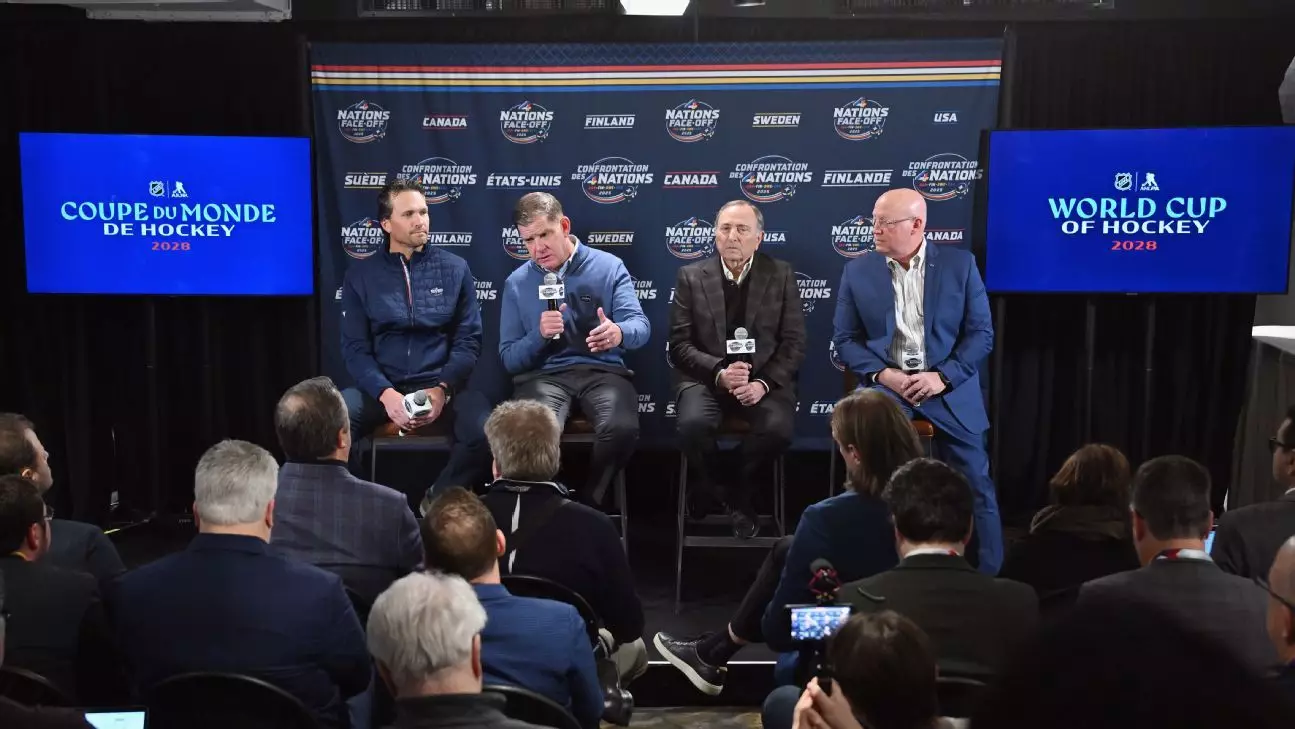In a significant development for hockey enthusiasts worldwide, NHL Commissioner Gary Bettman and NHLPA Executive Director Marty Walsh announced that the World Cup of Hockey is set to return in February 2028. This declaration marks a pivotal moment for the sport, as it not only revitalizes fan interest but also fulfills a longstanding desire among players to engage in high-stakes international competition. After nearly a decade of absence, this event signals a rejuvenated focus on global tournaments, indicating that the NHL and its players are aligning their interests for the future of hockey.
The NHL has not sent its players to the Olympics since 2014, causing a noticeable gap in top-level international play. With the collaboration affirmed for the 2026 Winter Olympics in Milan, and with the World Cup scheduled shortly after, hockey fans can anticipate a regular rhythm of elite competitions. Bettman labeled the recent Four Nations Face-Off—featuring teams from the United States, Canada, Finland, and Sweden—as a sampler of what’s to come. It’s both a prelude and a reiteration of the league’s commitment to showcasing the best athletes on an international stage.
Bettman has also confirmed that the upcoming World Cup will diverge from the previous tournament’s structure. Notably absent will be hybrid teams like Team Europe or the U-23 North American squad; instead, each participating nation will be represented solely by its own players. This shift aims to enhance national pride and deepen the competitive spirit, ensuring that traditional rivalries and unique national identities play a central role in the event’s narrative.
While the hosting cities for the World Cup are yet to be finalized, Bettman opened the floor for bids—including international options. This approach underscores the NHL’s commitment to expanding its global footprint and generating a more inclusive atmosphere for international hosts. The expected format will include at least eight teams, but anticipation of the final configuration remains high, reflecting the excitement and speculation that surrounds major sports tournaments.
No discussion of international hockey is complete without addressing the complexities surrounding Russia’s involvement. Since the invasion of Ukraine in 2022, Russia has faced a ban from international competitions imposed by the IIHF. This exclusion has not only sidelined a formidable roster of athletes but has also prompted significant conversations about player rights and international relations within the sport. As Bettman noted, the status of Russian players in forthcoming events depends heavily on evolving geopolitical circumstances.
Walsh has emphasized the emotional stakes, echoing sentiments expressed by Russian players who yearn to return to the ice on a global scale. The NHLPA stands firm in its advocacy for players’ participation regardless of political landscapes, underscoring the intricate balance between the sport and international politics. The NHL’s alignment with entities like the IIHF on this matter reveals the intricate relationship between sports governance and global affairs.
In addition to the announcement regarding the World Cup, the joint conference highlighted a more relationally harmonious phase between the NHL and NHLPA. The impending negotiations for a new collective bargaining agreement (CBA), which will take effect in 2026, are expected to signal a continuation of positive developments in their partnership. Bettman’s optimism regarding a smooth negotiation process suggests that both sides are committed to foundational stability that could facilitate future international events.
The collaborative nature of international competitions was articulated by Bettman, affirming that the joint decisions made with increased cooperation could lay the groundwork for the long-term health of the sport. The positive rapport between Bettman and Walsh not only solidifies negotiations but also reinvigorates faith in a future where international hockey once again thrives.
As the hockey community gears up for the revival of the World Cup and the inclusion of NHL players in the Olympics, it’s clear that we stand on the brink of an exciting new chapter. The passion for best-on-best competition is palpable, and the potential for a fully represented global hockey stage is nearer to realization than ever before. The complexities surrounding players like those from Russia add layers to the narrative but also emphasize the sport’s capacity to transcend political barriers.
Ultimately, this renaissance is most deeply rooted in the players’ desire to represent their countries at the pinnacle of the sport, and with both the NHL and NHLPA working closely, the next few years promise to bring thrilling hockey back into the international spotlight. As we prepare for this evolution, the hockey world watches eagerly, hopeful for the dazzling displays of skill and heartbreak that only international competition can deliver.


Leave a Reply